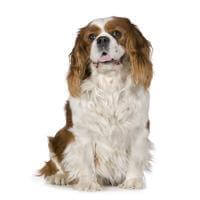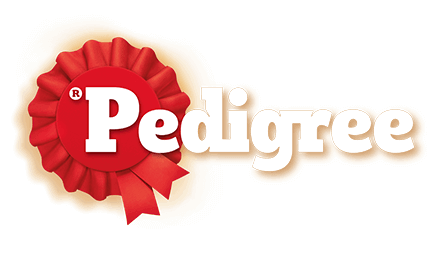Find products that match your dog’s needs

The Cavalier King Charles Spaniel dog breed is known for its affectionate and gentle nature, making it a beloved companion for families and individuals alike. With their expressive eyes and silky, wavy coats, Cavalier dogs captivate hearts at first sight. Understanding their traits is crucial for both potential and current owners to ensure a happy and healthy relationship. So, continue reading if want to discover more about the Cavalier King Charles Spaniel temperament, size, and care requirements.
Before bringing this breed home, learn about Cavalier King Charles Spaniel’s height, weight, and lifespan:
Weight | 5.5 to 8 kg |
Height | 12 to 13 inches |
Lifespan | 12 to 15 years |
Coat | Silky |
Note: The weight and height mentioned on the table is of a full-grown Cavalier King Charles Spaniel and not of a Cavalier King Charles Spaniel puppy.
Cavalier King Charles Spaniels are known for their smooth, long coats that require regular grooming. These beautiful coats come in four distinct colour patterns:
Fun fact: The black and tan coat colour is the rarest among this breed, so if you see a Cavalier King Charles Spaniel with this combination of coat, count yourself lucky.
People often mistake Cavalier King Charles Spaniel dogs for other breeds like the English Toy Spaniel due to their similar appearance. To identify a purebred Cavalier King Charles Spaniel, look for these characteristics:
Cavalier King Charles Spaniel puppies start showing these distinctive traits early in their development, making them easy to identify.
Cavalier King Charles Spaniels are the epitome of affectionate and undemanding family dogs. With their friendly and gentle temperament, they make excellent companions for both children and the more active elderly. These dogs are not excessive barkers but will announce strangers even though they are no guard dogs. Cavalier King Charles Spaniel are known for their social tendencies and get along well with cats and other small pets. Whether quiet and sedate or rowdy and rambunctious, Cavaliers are eager to meet everyone, making them the perfect lap dogs and loving companions.
Training and socialisation are crucial for the Cavalier King Charles Spaniel dog breed. Early socialisation and consistent training are essential to help Cavalier King Charles Spaniel puppies develop good manners and adapt to various situations. These affectionate and eager-to-please dogs excel in canine sports such as rally and agility. Positive training methods, especially reward-based training involving dog treats, are highly effective for this breed. Continued training into adulthood ensures that Cavaliers remain well-behaved and responsive.
Caring for a Cavalier King Charles Spaniel is a rewarding journey filled with love and joy. Here are all the essentials you need to know to keep your furry friend healthy, well-groomed, active, and well-fed, ensuring your Cavalier thrives in every way possible.
Cavalier King Charles Spaniels are prone to certain breed-specific health conditions, such as eye problems, patella luxation, hip dysplasia, middle ear infections, mitral valve heart disease, and syringomyelia. Regular vet check-ups and screenings can help detect these issues early. Responsible breeders will health-test their breeding stock to minimise the risk of such breed-specific medical issues. But here’s good news: despite these potential health issues, many Cavaliers live comfortably into old age.
The Cavalier King Charles Spaniel's silky coat requires regular grooming to stay in top condition. Weekly brushing helps keep the coat shiny and tangle-free, while also serving as a bonding experience. Occasional baths will maintain their lustrous appearance. Check their ears weekly for signs of infection and trim their nails at least once a month to prevent pain and structural issues. Regular grooming sessions also provide an opportunity to inspect for any unusual bumps or problems.
Though Cavalier King Charles Spaniels are known as lap dogs, they enjoy moderate exercise and outdoor activities. Daily walks and participation in canine sports like agility are great for their physical and mental health. A fenced yard is recommended to keep them safe while they explore.
Feeding a Cavalier King Charles Spaniel a high-quality dog food appropriate for their age — whether puppy, adult, or senior — is essential. Cavalier King Charles Spaniel puppies, in particular, need proper nutrition for growth. Be mindful of their calorie intake to prevent obesity. Treats can be used for training but should be given in moderation. Avoid giving table scraps, especially cooked bones and high-fat foods. Consult your vet for dietary advice tailored to your Cavalier dog's specific needs to ensure a balanced diet throughout their lifespan.
The Cavalier King Charles Spaniel dog breed originated from the toy spaniels depicted in 16th to 18th-century paintings by artists like Titian and Gainsborough. These dogs were favorites among royalty, particularly King Charles II, who adored them. By the 1800s, their popularity waned, but an American named Roswell Eldridge revived the breed in the 1920s by offering prizes for dogs resembling those in historical portraits.
Explore our breeds category page to learn more about different dog breeds and find your perfect companion.
The average lifespan of a Cavalier King Charles Spaniel is typically between 12 to 15 years. Despite being prone to certain breed-specific health conditions, many Cavaliers live comfortably into old age, bringing years of joy and companionship to their families.
A Cavalier King Charles Spaniel’s temperament is affectionate and gentle. It is known for being friendly and social, making them excellent companions. Moreover, their adaptable nature suits various lifestyles and family settings.
Yes, Cavalier King Charles Spaniels are excellent family dogs. Their gentle and friendly temperament makes them ideal companions for children and the elderly.
Cavalier King Charles Spaniel puppies are eager to please, making them easy to train. They excel in obedience and agility due to their intelligent and cooperative nature.
Feed your Cavalier King Charles Spaniel puppy a high-quality, age-appropriate wet and dry dog food. Consult your vet for specific guidelines tailored to your Cavalier's needs. Monitor their weight to prevent obesity and ensure balanced nutrition.

Find a PEDIGREE® stockist
near you!
Buy online
Click to buy from any of the retailers below

